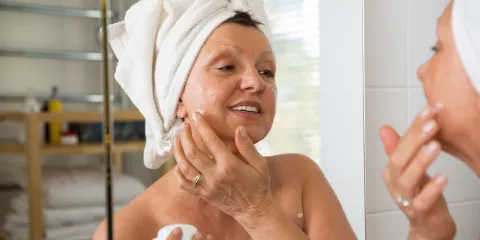
Having sex is a great way to stay physically and mentally healthy at any age. Popular belief may lead you to think that your sex life comes to an end when you reach middle age and no longer have your same youthful libido. However, for many, sex actually gets better as you learn more about yourself, your body, and your sexual preferences while aging.
Both men and women experience a variety of changes in their bodies once they reach their 50s. From potential physical or mental limitations, shifts in sex drive, and side effects from illnesses or certain prescription medications, there are many factors that may affect how much you enjoy having sex as you age. With these changes comes the need to learn new safe sex practices, beyond just protecting yourself from sexually transmitted diseases or infections.
By making small adjustments and making sure you’re prioritizing safe practices now, you can enjoy a healthy, thriving sex life in your 50s and well beyond. To help, we’ve gathered some useful tips and suggestions to keep in mind for your best sexual health in your 50s.
Health Benefits of Sex in Your 50s
By making changes in your approach to your sexual health in your 50’s, you can enjoy many years of great sex in the decades to come. Whether you’re single, married, or newly single again, sex in your 50s is an important part of a healthy lifestyle, packing a range of mental, physical, and emotional benefits. Some of these benefits, like stress reduction and improved sleep, can even impact your health significantly in the coming years.
In fact, a 2019 study from the University College London suggested that a higher frequency of sex in older adults is linked to lower rates of cancer, coronary heart disease, and other chronic illnesses.1 Additionally, in a study published by The American Journal of Cardiology, it was reported that men who had sex at least twice a week were 50% less likely to die of heart diseases compared with men who had it only once per month.2
Sexual Health Tips for Women in Their 50s
Although post-menopausal women experience a drop in estrogen, which can lead to vaginal dryness and thinner vaginal walls, this doesn’t necessarily mean that libido for women in their 50s drops entirely. Libido is a complicated part of sexual health and many factors influence it. For example, not making adjustments to sexual practices or having a disconnected marriage can easily lead to a libido drop.
Ever been told “You better use it or you’ll lose it!”? If you want to make sure you’ll enjoy a comfortable sex life in your 60s, 70s, and beyond, you may want to pick up the pace now. In 2011, The University of California, Los Angeles, reported that a greater frequency of sex is linked to less genital dryness and discomfort during sex.3
To aid with dryness or vaginal discomfort, consider using an over-the-counter, water-based lubricant. Sex toys, once lubricated, can also help with stimulation and triggering the flow of natural lubricants that may just need an extra boost to get going. You may also find that you need a little more time or a new type of touch to feel fully aroused. It’s important to communicate this with your partner, along with any other changes or discomfort you feel.
Sexual Health Tips for Men in Their 50s
Men in their 50s may begin to experience a natural decrease in sex hormones, though not as dramatically as women. For many, this results in Erectile Dysfunction (ED). While prescription medications, like Viagra and Cialis, are indicated for restoring impaired erectile function by increasing blood flow to the penis, they don’t address overall libido drop or loss of sexual desire.
To help with arousal, consider adding in longer time for foreplay, and even having your partner utilize over-the-counter lubricants or sex toys to create more sparks and stronger erections while easing into the act of penetration. You may also discover that arousal and ejaculation simply take longer these days. Don’t worry! Use it as an opportunity to enjoy longer and slower foreplay and to explore other sexual experiences beyond penetration.
Sexual Health Tips for Couples in Their 50s
If they are parents, many couples in their 50s enjoy a large milestone which tends to create opportunities for an increase in sexual activity - empty nesting! Having more privacy and free time creates an environment where sexual spontaneity and intimacy can thrive, often “reigniting the flame” between them.
For non-parents and parents alike, many couples in their 50s enjoy a less inhibited sexual experience. More mature than they were in their 20s or 30s, each person may have less insecurities around their bodies and more comfort with their partners. This may provide for a deeper intimate experience where both partners feel free to play, explore, and express themselves sexually together. Very well, their 50s can serve as a bit of a sexual renaissance as a couple.
The best way to keep things interesting? Try something new. If you’ve been together for more than a decade, don’t try to recreate your younger years. Instead, use your new chapter of being in your 50s as an opportunity to get to know each other, explore new desires, and modify your go-to’s to meet any physical changes you may have experienced. Enjoy the trust fostered by a long-term relationship and don’t take yourselves too seriously - have fun!
Enjoy Sex In Your 50s and Beyond
When approached with curiosity, an open mind, and a sensitivity to the physical and mental changes you and your partner have experienced as you age, sex in your 50s can very well be the best of your life! By making these small adjustments in your approach to sex, you can enjoy a healthy sex life in your 50s, 60s, 70s, and beyond.
As always, be sure to speak with your healthcare provider about any health changes you may experience, options available to you, and any risks you may need to consider.
Articles You Might Also Like
References
1 Jackson S, Yang L, Koyanagi A, Stubbs B, Veronese N, Smith L. https://link.springer.com/article/10.1007/s10508-019-1443-4 Ageing. Arch Sex Behavior. 2019;49:929-40. doi:10.1186/1471-2458-8-352
2 Hall S, Shackleton R, Rosen R, Araujo A. Sexual Activity, Erectile Dysfunction, and Incident Cardiovascular EventsAm J Cardiol. 2010 Jan 15; 105(2): 192–197. Doi: 10.1016/j.amjcard.2009.08.671
3 Thomas HM, Bryce CL Ness RB, Hess R. Dyspareunia is associated with decreased frequency of intercourse in the menopausal transition. Menopause. 2011 Feb; 18(2): 152–7. doi:10.1097/gme.0b013e3181eeb774












